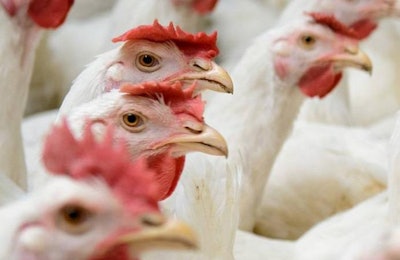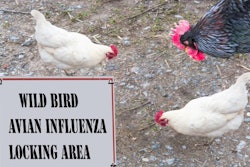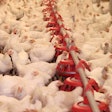
Multiple outbreaks of highly pathogenic avian influenza (HPAI) have been confirmed in Russia’s poultry sector — spreading into an additional region — and the disease has also affected a farm in China’s Qinghai province.
Following an initial outbreak of HPAI in poultry in the Kursk oblast that was reported to the World Organisation for Animal Health (OIE) two weeks ago, Russia’s agriculture ministry has followed up with a report confirming the detection of an H5 virus variant at a further 16 locations. These included 14 backyard flocks, as well as two commercial farms with around 190,000 and 291,000 birds.
From this report, it appears that the infection appears to have spread rapidly around Kursk oblast — where the initial outbreak was reported — and further to Samara and Penza. The farms affected belong to Penza Mollnvest and Pticefabrika Vasilevskaya, and are located in one of Russia’s commercial poultry centers. The 16 latest outbreaks affected more than 485,000 of Russia’s poultry.
Since the official OIE report was published, infectious disease blog, Avian Flu Diary (AFD) has picked up a Russian local media report of a further HPAI outbreak. Latest to be affected was a backyard poultry flock in Livny, which is located in Oryol oblast. The first outbreak of the disease in this region, it represents further evidence of the sudden and rapid spread since the first confirmed cases in the country in mid-June.
Avian flu in Bulgaria
On national television, Bulgaria’s agriculture minister has warned that new outbreaks of HPAI in birds should be expected, and called on authorities to take serious measures against infection. According to local news agency, Focus Information Agency, more than one million eggs will be withdrawn from the market because of outbreaks of the disease. The minister stressed, however, that the virus does not pose a threat to human health.
According to official reports to the OIE, Bulgaria has experienced seven HPAI outbreaks in poultry caused by the H5N8 virus variant since March of this year, affecting more than 58,000 birds. In addition, a local source last week reported a further outbreak at a large commercial farm in Dobrich province.
Avian flu in China, elsewhere
HPAI appears to have returned to China’s poultry sector. Latest to be affected was a broiler farm in the Haixi Mongolian Tibetan Autonomous prefecture of Qinghai province, according to AFD citing China’s Ministry of Agriculture and Rural Information Office. The presence of the H5N1 virus subtype was confirmed after 1,050 of the birds died. The report says the epidemic has been effectively controlled.
Among the wild bird population in Scandinavia, the H5N6 has been detected in recent months, generally in eagles tested after being found dead. The Danish veterinary authority has reported in the last week to the OIE that a further eagle, which was found sick and subsequently euthanized in March of this year, has also tested positive for this virus.
Turning to Africa, the animal health agency in Cote d’Ivoire (Ivory Coast) has informed the OIE that HPAI is no longer present in the country. The H5N1 virus was first reported in May of 2015, but there have been no new detections since October of 2016.
Finally, in Asia, Vietnam’s agriculture ministry reports that the HPAI situation has been “resolved.” Just one outbreak caused by the H5N6 virus variant in a backyard flock occurred in February of this year.

















